If you're trying to decide on a cordless tool should your decision really come down to something as seemingly trivial as Team Red vs. Team Yellow (or teams green, orange, or blue)?
With all of the new and improved cordless tool options on the market these days, how are you expected to make a decision on which tools are the best to add to your arsenal? More importantly, can you and should you decide on a single brand and not deviate?
For the last year I've been looking to upgrade some of my more dated 14v and 18v tools to newer cordless versions, but all of the options felt overwhelming. The more I looked the more it felt like I had to choose a tool brand battery I liked best and stick with it for all of the tool purchases. How did this happen? How did the choice of a battery platform begin driving all of our decisions? It just seems foolish.
After much deliberation and tool nerd reflection, I've finally made a decision, and I'm surprising myself. In the end I'm going to go with multiple battery brands so I'm not locked into a single format! Hear me out before you say that it's ridiculous (and possibly too expensive).
Over the last several months I've been able to attend and cover several tool and utility brand events on behalf of Charles & Hudson and ToolCrave.com (check them out to see my Milwaukee recap and DeWALT recap post event summaries). This has allowed me to get a glimpse into some of the latest and greatest hardware offerings and future plans from brands like Milwaukee ("Team Red") and DeWALT ("Team Yellow"). It also allowed me to pick the brains of a bunch of tool pros, journalists, and tool brand staff that are also real tool junkies. The whole time I had thoughts regarding my own decision in the back of my mind, so I was also using these events as an opportunity to improve my education to make my own choice.
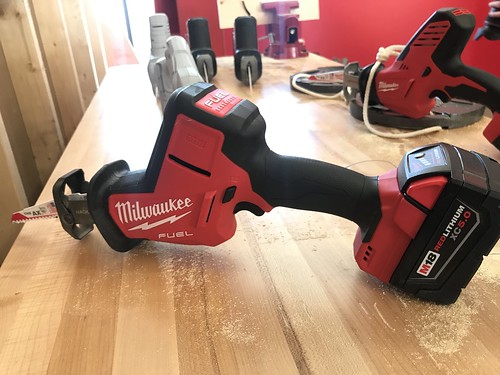
The new Milwaukee one Handed Hackzawl on the M18 platform coming in October
If you look in our basement today you'll often see a mess, along with a good number of tool brands scattered around my shelves. From Makita to DeWALT, Milwuakee to Hitacchi, and so many brands in between. But when it comes down to it, my few battery powered tools are DeWALT or GreenWorks. This wasn't a conscious decision, it's just how it happened. I had a DeWALT 18v hammer drill, so when I needed a battery powered jigsaw I bought an 18v DeWALT jigsaw. I didn't put much thought into the tool beyond the battery, but today I understand that's a flaw in my thought process. Apparently it also caused me so much angst that I was unable to keep the basement organized. Yeah...that's the ticket.
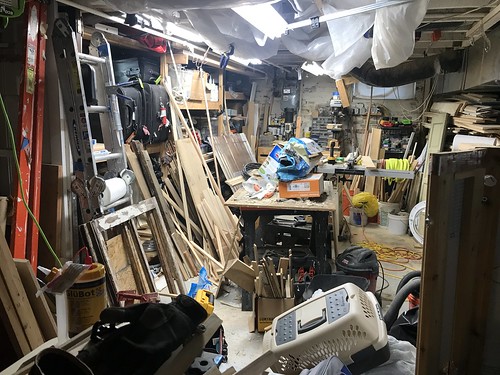
Don't worry, I hate myself for the basement looking like this
The good news is that our mess of a basement is way cleaner now that I spent some quality time with it last weekend.
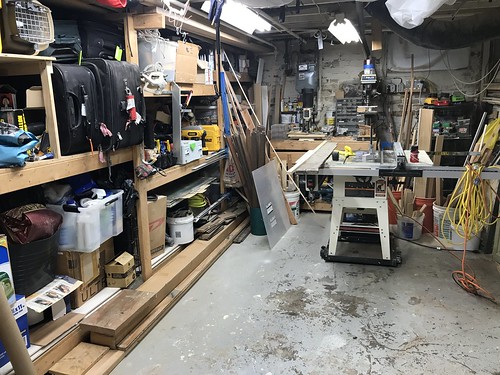
Still some work to do, but so much better. Okay, back to batteries.
I was too focused on which battery I had rather than the tool that I needed. What I should have been doing was looking at the tool I needed and then figuring our which features of which brand would work best for me. If the tools were nearly equal between brands, then I could go with the one whose batteries I already own, but as soon as I started to diversify my battery decision, I wouldn't be stuck having to go with a lesser preferred choice simply because the tool I wanted didn't fit the batteries I already had.
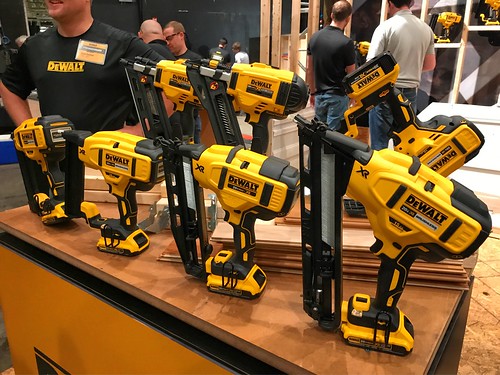
DeWALT's new line of cordless nailers with low profile 20v batteries
In fact, I was talking with Kyle, the owner of Rural Renovators (@rrbuildings on Instagram, he's building some awesome post and beam structures and sharing the process) who put it best when he said, "Choosing sides really doesn't help anyone, I prefer Team Best Tool." After all, there's little reason to focus so heavily on a single brand of tool that you ignore all of the benefits that tools from another brand can bring you.
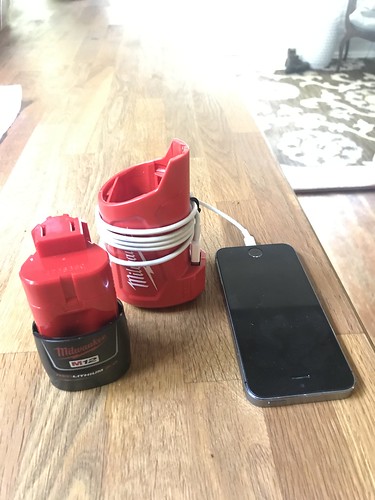
Milwaukee's M12 has a great USB charger accessory that can charge USB devices or be charged by USB
When it comes down to it different tool brand batteries will have different strengths. For example:
Milwaukee has some of the best tool and battery combinations on the market when it comes to power and run time. They also maintain backwards compatibility with their old tools so your new batteries will work with older tools you might have. They also have plenty of tools you can't find in other brands. But their tools do tend to cost more than the competition as they have historically targeted the trades more than the DIYers.
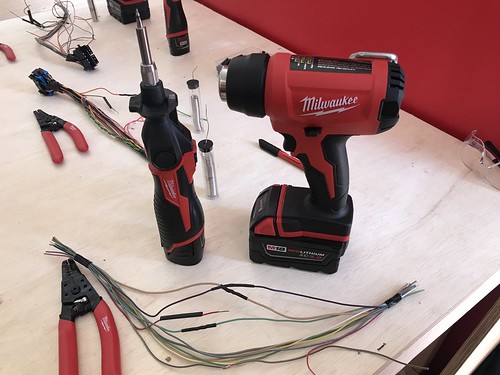
Cordless Soldering Iron and Heat Gun that I really want
DeWALT has some of the best flexibility with their 20v line, including standard and low profile sizes. They also added their FlexVolt options last year to power tools like their cordless table saw, miter saw, new air compressor, track saw, and framing saw. Even if you absolutely love Milwaukee, many of these tool options just aren't available under the Milwaukee nameplate right now. There's even some level of cross compatibility in the 20v line among tool brands that are owned by the DeWALT parent company (MacTools, Porter Cable, Craftsman, Black + Decker), so keep that in mind.

DeWALT's FlexVolt battery powering their new Track Saw
More consumer friendly or entry level brands that are less focused on the pro market, like Ryobi, Porter Cable (now that they're under DeWALT/Stanley Black + Decker) and GreenWorks, will focus more on the basic and purpose built tool needs and budget friendly aspects of the market. If you're more concerned with building your basic tool inventory, and less worried about specialized tool compatibility, features like remaining charge indicators or bluetooth, battery power, and the more niche accessories that the batteries will work with, then these brands may well be for you.
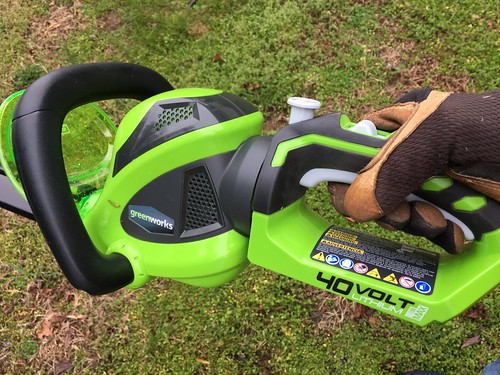
Our 40V GreenWorks hedge trimmer, we also have a string trimmer.
There are also certainly more pro-centric tool brands that spring to mind, but don't let their sometimes hefty price tag deter you if you're a dedicated DIYer. A Festool purchase will sometimes cost you double or more than a competitor's tool, but if it's something you'll be using almost every day, like a track saw for many wood workers, sometimes the price is secondary to form, function, and quality of the tool and its features.
Bottom line is that there's always going to be some give and take no matter what you go with. Advancements in brushless motors to extend battery life and increase tool power, more versatile charging stations, and niche accessories will tend to set the bigger names apart from the smaller, but it all comes down to what you need and matters to you.
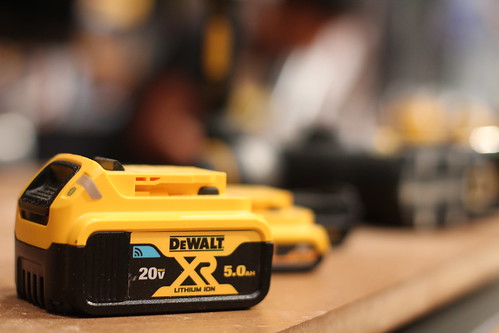
DeWALT's bluetooth enabled batteries to help with security and future capabilities
So the end result of my journey in making a tool purchase decision is a realization that I'm going to have many different battery brands on my charging station. I'll likely have primarily DeWALT with their 20V and FlexVolt lines (especially with the cross compatible DeWALT owned brands like Porter Cable, Stanley, Black + Decker), along with a fair number of Milwaukee M12 and M18 Fuel batteries. My existing GreenWorks yard tools will stay with us, and I may end up adding a few Festool options that I've been thinking about for many years.
The key to this whole toolbox transition is going to be keeping an eye out for specials or discounts where I can pick up extra batteries as a part of the tool purchase for not much more than the bare tool would cost itself. Taking this approach will allow me to add to the inventory of batteries for each brand, making it less of a task to add a tool that I need.
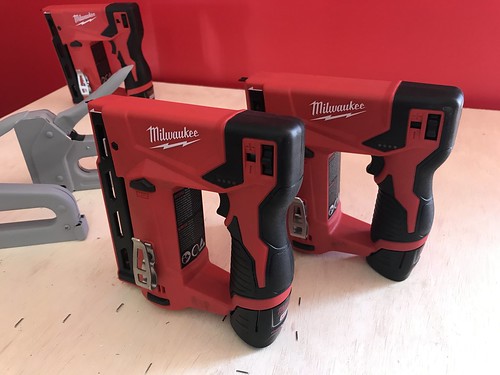
Milwaukee's new cordless stapler with the M12 battery
What I've learned is that there are just too many instances where one brand will have a tool that I would really like, but if I'm 100% on a single battery of a different brand, I'm stuck. There's just no need to add this level of angst to the purchase process.
I'll be sharing the various new items I'm planning on picking up over the next several months and will also be doing some basic reviews of each. But one thing is for sure, you won't hear me doing any trashing of Team Red or Team Yellow, because my workbench will likely be all colors of the rainbow before too long. Now where can I find those Team Purple batteries?
So what do you think? Does my justification of multiple battery brands make sense, or are you still squarely in the "Team <InsertColorHere>" camp? What about your workshop? Do you have a particular brand that's more prevalent then others? Or are you hoping to move one way or another in your future purchases? Would love to hear your thoughts.
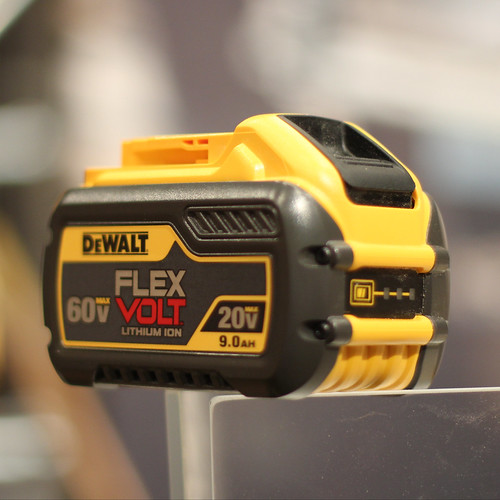
![]()
![]()